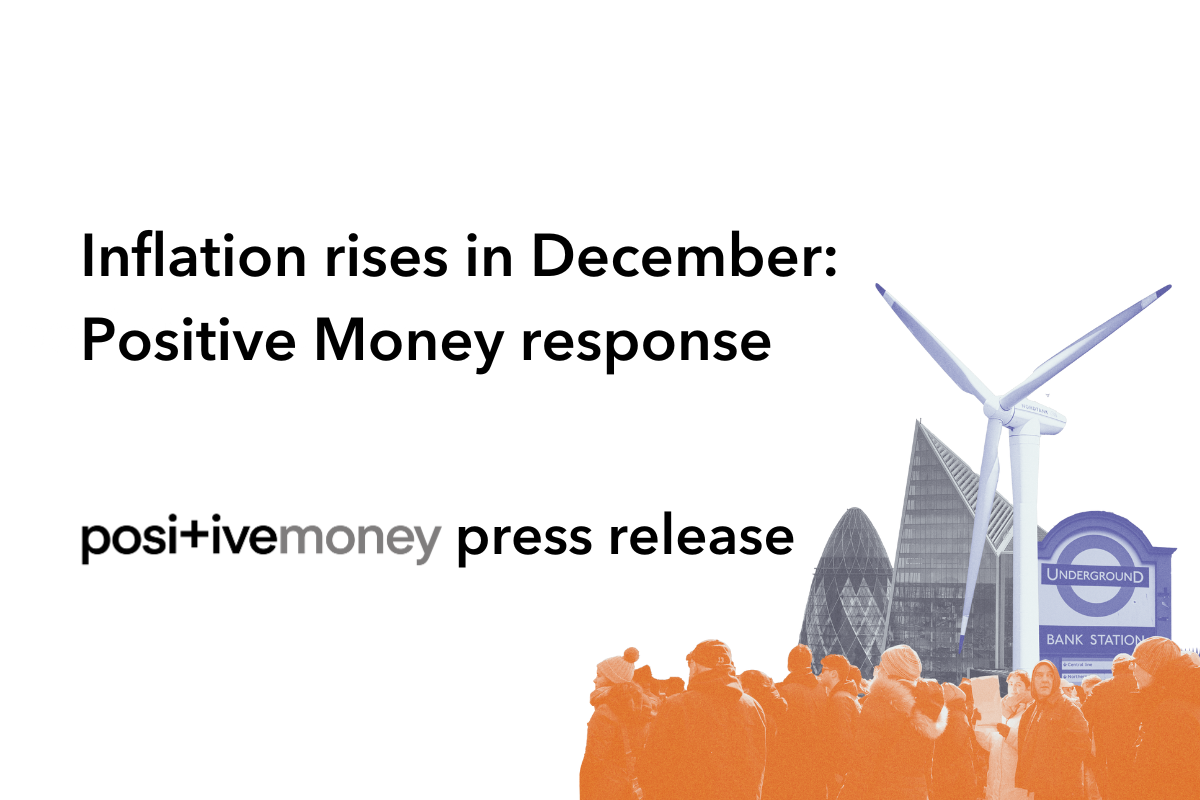
Monetary policy and inequalityUK
21 January 2026
LONDON, 5th July 2022 – Ahead of the Bank of England’s Financial Stability Report, 75 leaders from civil society and academia have written to the government calling for a new vision of green finance to help tackle the cost of living crisis, improve the UK’s energy security and accelerate the green transition, by ensuring that rising interest rates do not choke off critical green investment and shifting financial flows out of fossil fuels.
Notable signatories include Kate Raworth, author of the bestselling ‘Doughnut Economics’, Simon Wren-Lewis, former Treasury economist and Emeritus professor at Oxford University, Tim Jackson, author of �‘Post Growth: Life After Capitalism’, and Nick Robins, advisor to the Climate Change Committee.
The letter highlights the significant risks to financial stability posed by unmitigated climate change, after the Bank’s own climate stress test found that climate change could cost UK banks and insurers up to £340 billion in a severe physical risk scenario in which climate action is delayed.
Last week’s Climate Change Committee Progress report showed that the UK is not on track across the majority of progress indicators on net zero, with credible plans covering only 39% of required emissions reductions. The letter is written in anticipation of the government’s new Green Finance Strategy, which Kwasi Kwarteng’s Department for Business, Energy and Industrial Strategy recently consulted on, and which the signatories argue offers a major opportunity to ensure finance plays its part in plugging this delivery gap.
The letter calls for five core principles to ensure the Strategy is a success:
A clear plan for aligning financial flows with a 1.5C pathway and nature protection goals, with independent mapping of progress and investment gaps across public and private finance.
Actively shifting financial flows, by reflecting the high risk of fossil fuel lending in regulation, and measures to keep the cost of green lending low, even in the current high-inflation, higher-interest-rate environment.
A key role for public investment in driving a fair transition, as well as strategic public finance to create scale up private investment, for instance through the UK Infrastructure Bank.
A strong regulatory framework for enforcing the private sector transition to net zero, based on a UK taxonomy that rejects classifying gas or biomass as ‘green’, and with a new statutory objective for regulators to align the finance sector with net zero.
Leading internationally and fulfilling global commitments, for instance by scaling up grant-based support to low-income countries, and ending UK financing of new fossil fuel infrastructure abroad.
The letter argues that the government’s plans to exploit domestic oil and gas reserves “will not improve the UK’s energy security or bring down bills”, and cites the International Energy Agency warnings that investment in new fossil fuel projects beyond 2021 is incompatible with a 1.5C pathway. It argues that the government needs to move from “private sector engagement and measuring climate risk towards actively shifting capital allocation, and adopt a precautionary approach to addressing climate-related risks.
Signatories also push back on Treasury proposals to give regulators new objectives to promote the ‘international competitiveness’ of the financial sector, and calls instead for statutory objectives on net zero alignment and nature protection. More details are expected in the Financial Services and Markets Bill, which Chancellor Rishi Sunak is anticipated to announce at the annual Mansion House dinner for bankers on the 19th July.
Fran Boait, Executive Director at Positive Money, commented:
“Getting the UK’s rampant fossil fuel financing under control is key to tackling energy bills, making us energy-secure, and maintaining a liveable planet. With the Bank of England raising interest rates and upping the cost of borrowing, it’s even more urgent that the government takes steps to keep investment flowing to green projects and technologies.
“Today, experts have set out exactly how the government can align financial flows with a 1.5C pathway, using public investment to fairly distribute benefits and costs, strengthening regulation to ensure private financial institutions live up to their promises, and using the final months of the UK’s COP presidency to drive ambition globally.”
Lukasz Krebel, economist at the New Economics Foundation, commented:
“The current energy crisis, fuelling high inflation and further deepening the cost of living scandal, highlights the urgency of reducing the UK’s reliance on volatile fossil fuels. Meanwhile, the Climate Change Committee warned last week that only 8 of 50 key indicators of UK progress to net zero are on track. The refresh of the Green Finance Strategy offers an opportunity for the government to ensure that finance plays its part in responding to these challenges. Today’s letter endorsed by over 70 experts outlines five clear principles on how the government should steer financial flows away from harmful activities and towards green investment.”
Notes:
Download the full joint statement here: https://positivemoney.org/2022/07/joint-statement-green-finance-strategy/
Department for Business, Energy and Industrial Strategy, ‘Update to Green Finance Strategy: call for evidence’, 12th May 2022: https://www.gov.uk/government/consultations/update-to-green-finance-strategy-call-for-evidence
Bank of England, ‘Climate Biennial Exploratory Scenario (BES) exercise on financial risks from climate change results’, 24th May 2022: https://www.bankofengland.co.uk/stress-testing/2022/results-of-the-2021-climate-biennial-exploratory-scenario
Sunak to unveil plan to slash EU financial services rules in Mansion House speech, City AM, 24th June 2022: https://www.cityam.com/exclusive-sunak-to-unveil-plan-to-slash-eu-financial-services-rules-in-mansion-house-speech/
For more information or to speak to a spokesperson please contact press@positivemoney.org.uk or Anna Pick on 07948802104.
About Positive Money
Positive Money is a research and campaign organisation working towards a money and banking system which supports a fair, democratic and sustainable economy. Set up in the aftermath of the financial crisis, Positive Money is a not-for-profit company funded by charitable trusts and foundations, as well as small donations from its network of over 65,000 supporters. www.positivemoney.org.uk
ENDS.
